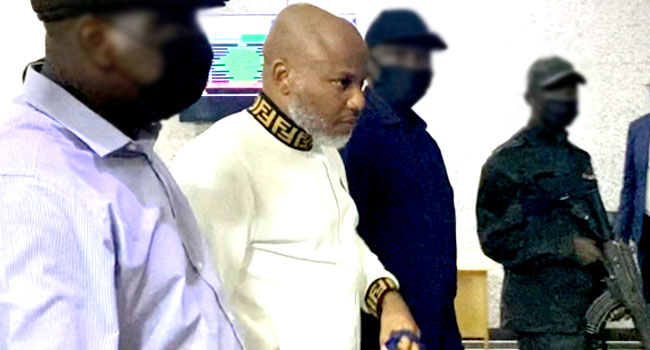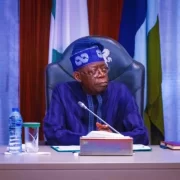Nnamdi Kanu ‘Exposes’ Three Appeal Court Errors Before Supreme Court

Lawyard is a legal media and services platform that provides…
The embattled leader of the Indigenous People of Biafra (IPOB), Mazi Nnamdi Kanu, has asked the Supreme Court to compel the Muhammadu Buhari-led Federal Government to release him in accordance with the October 13 judgment of the Court of Appeal discharging him.
The IPOB leader’s request is contained in the three-ground notice of cross-appeal he filed in the appeal by the Federal Government, challenging the Appeal Court’s October 13 judgment freeing him.
The pro-Biafra activist asked Nigeria’s apex court to set aside the Appeal Court’s judgment “as it relates to issues two, three and five formulated before the court.”
Nnamdi Kanu through his lawyers also asked the Supreme Court to direct the Buhari administration to release him from the custody of the Department of State Service (DSS) where he has been since June 26, 2021.
He filed a notice of appeal praying to the apex court to reverse the October 28 ruling by the Court of Appeal, staying the execution of its October 13 judgment.
In ground one, Nnamdi Kanu argued that the Appeal Court erred in law when it held that “the main purpose of a charge is to give the accused person a notice of the case against him and that is why the law is that an omission in a charge will only be fatal if it does not put an accused person on proper and sufficient notice of the case against him to enable him prepare adequately for his defence,” without due deference to the mandatory requirements of the laws which limit the criminal jurisdiction of the Federal High Court only to criminal offences committed within the jurisdiction of the court.
In ground two, he said that the Appeal Court erred in law when it held that “as long as the appeal against the proscription of IPOB has not been determined, the order of proscription is still valid and subsisting,” and thereby occasioned a miscarriage of justice.
In ground three, Nnamdi Kanu argued that the Court of Appeal “erred in law when it held that it is only when evidence has been adduced by the prosecution in proof of its case and the proof of evidence is thus admitted in evidence, that the competency or otherwise of the proof of evidence/charge, can be attacked; and that as such, it was premature to make a pronouncement on the relative strength of proof of evidence before the commencement of trial, and thereby occasioned a miscarriage of justice.”
Lawyard is a legal media and services platform that provides enlightenment and access to legal services to members of the public (individuals and businesses) while also availing lawyers of needed information on new trends and resources in various areas of practice.













